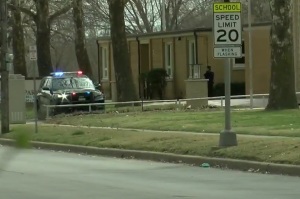Bible Group Sends Soldiers Daily Dose of Hope
Every day, Pfc. Jason receives a one-minute phone call from a stranger in a soothing voice that tells him about the peace and hope found in God.
Jason had served as an American soldier in Afghanistan and thought his life would be better once he returned to the United States. But he suffered extreme loneliness, loss of purpose, and resorted to downing a bottle of whiskey to fall asleep once back in the States. He had Post-Traumatic Stress Disorder.
"[Y]ou can't get the war outta (sic) your head," Jason writes in a posting on the Hope for the Heroes website. "I had all these images floating around in my dreams, night time was the worst."
But "on a whim" he signed up for 411God Hope for the Heroes, a project by the ministry Back to the Bible. The messages are catered to American service members, many of which have PTSD, and are delivered each day as a one-minute phone call to give the listener encouragement from the Bible.
Soldiers can also choose to receive a text message instead of a phone call.
"[I]t brought me hope," said Jason. "I started to get strength from that little phone call each day to start looking for a job, to move home and to share a little of what was going on in my head."
Though the Afghanistan veteran admits he still has "horrible days," the word of hope offers him something else to think about other than the war.
"I have something that gives me hope," he stated.
Alicia Reisinger, the producer and voice behind 411God Hope for the Heroes, said the idea for the original 411God messages – which are made for a general audience and includes messages ranging from funny to sad – was inspired by a study done by the ministry's research arm, the Center for Bible Engagement.
The study examined why many people have Bibles but do not read them. The head of the Center found a link between people who read the Bible and their behavior. He found that people who read the Bible more than four times a week had significantly less problems in emotional sickness, drug dependency, and marital woes. The center then set out to create tools that would make Bible reading easier for people, one of which is 411God.
Hope for the Heroes is the 411God version geared toward soldiers, their families, and returning soldiers that are struggling with PTSD.
The majority of people signed up for Hope for the Heroes are located in the United States. Most of the soldiers in war zones, such as Iraq or Afghanistan, are not allowed to use cell phones. But they can receive Hope for the Heroes messages through the ministry's website, e-mails, or Facebook.
"A lot of the scripts that we created were actually born out of conversations we had with men and women that have return from Afghanistan or Iraq," Reisinger explained to The Christian Post this week.
She shared that her brothers who returned from Afghanistan and Iraq are experiencing PTSD and alcoholism. The Hope for the Heroes producer noted it is understandable that soldiers have PTSD because many who serve in war zones have had to pick up body parts of their dead friends and place them in body bags.
"We believe that while the military can design powerful weapons of war, only the word of God can win the spiritual battle raging inside every person," states the Hope for the Heroes website.
About the same number of people subscribe to the voice message as the text message, Reisinger said. Some people enjoy the emotions, music and sound effects in the voice version. But others prefer to be able to read the message throughout the day.
Back to the Bible is a Christian ministry that uses radio, Internet, TV and other media to share the Gospel message and help Christians grow to spiritual maturity through Bible teaching. The ministry broadcasts in more than 14 languages.
On the Web: www.hopefortheheroes.com





























